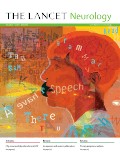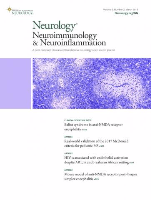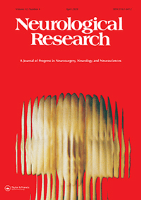
JOURNAL OF THE NEUROLOGICAL SCIENCES
Scope & Guideline
Exploring breakthroughs in clinical and experimental neurology.
Introduction
Aims and Scopes
- Neuroimmunology and Autoimmune Disorders:
Research on autoimmune conditions affecting the nervous system, including studies on autoimmune encephalitis, myasthenia gravis, and related therapeutic approaches. - Stroke and Cerebrovascular Diseases:
Focus on the pathophysiology, prevention, and treatment of stroke, including acute interventions such as thrombectomy and the impact of comorbidities. - Neurodegenerative Diseases:
Analysis of diseases like Alzheimer's, Parkinson's, and amyotrophic lateral sclerosis (ALS), exploring their mechanisms, progression, and management strategies. - Headache and Pain Management:
Investigation into various headache disorders, including migraine and tension-type headaches, and the application of interventions such as botulinum toxin. - Pediatric Neurology:
Research addressing neurological disorders in children, including stroke, epilepsy, and developmental disorders, focusing on clinical outcomes and management. - Neurorehabilitation and Quality of Life:
Studies aimed at improving rehabilitation practices and understanding the quality of life in patients with neurological conditions. - Neurosurgical Techniques and Innovations:
Exploration of new and existing surgical techniques for treating neurological disorders, including minimally invasive approaches and their outcomes. - Telemedicine and Virtual Care in Neurology:
Evaluation of the effectiveness and challenges of telemedicine in providing neurological care, particularly highlighted during the COVID-19 pandemic.
Trending and Emerging
- Telehealth and Remote Monitoring:
The COVID-19 pandemic has significantly accelerated interest in telehealth solutions for neurological care, with research focusing on the efficacy and implementation of virtual care models. - Neuroinflammation and Neurodegeneration:
There is a growing body of research examining the role of neuroinflammation in the progression of neurodegenerative diseases, highlighting potential therapeutic targets. - Personalized and Precision Medicine:
Emerging studies are increasingly directed towards personalized treatment approaches, particularly in conditions like multiple sclerosis and ALS, considering genetic and phenotypic variations. - Long-COVID Neurological Sequelae:
Research on the neurological impacts of COVID-19, including long-term cognitive and neurological symptoms, is gaining prominence as a significant area of inquiry. - Integration of Technology in Neurology:
Innovations such as artificial intelligence, machine learning, and wearable technology for monitoring neurological conditions are emerging as crucial topics of research. - Quality of Life and Patient-Centered Outcomes:
There is a notable increase in studies focusing on the quality of life and patient-centered outcomes in neurological care, reflecting a holistic approach to treatment. - Ethics and Neurology:
Ethical considerations in neurological practice, particularly concerning consent and end-of-life decisions, have become increasingly relevant, highlighting the need for ongoing discourse in the field.
Declining or Waning
- Traditional Pharmacological Treatments:
There seems to be a decreasing emphasis on purely pharmacological approaches to neurological disorders, with a shift towards integrative and multidisciplinary care strategies. - Basic Science Research:
Research that focuses on basic science without direct clinical application is becoming less frequent, as the journal increasingly values studies with immediate relevance to patient care. - Epidemiological Studies on Rare Neurological Disorders:
While still important, there is a noticeable decline in the number of papers focusing on rare neurological conditions, possibly due to the challenges in data collection and analysis. - Historical Perspectives in Neurology:
Papers that provide historical context or retrospective analyses are less common, indicating a potential shift towards contemporary issues and future directions in neurological science. - Single-Center Studies:
The trend towards multicenter collaborations suggests a decline in studies conducted at single institutions, as larger datasets are favored for robust conclusions.
Similar Journals

Neurological Sciences and Neurophysiology
Elevating the discourse in neurological research.Neurological Sciences and Neurophysiology, published by Wolters Kluwer Medknow Publications, serves as a pivotal platform for dissemination and discussion of recent advancements and research in the fields of neurology and neurophysiology. Since its transition to an Open Access format in 2020, this journal aims to enhance accessibility to crucial developments in neurological sciences for researchers, professionals, and students alike. With an ISSN of 2636-865X, it seeks to bridge the gap between clinical practice and experimental science, promoting innovative approaches to neurological disorders. While currently ranked in the Q4 quartile in the Neurology category, the journal is committed to improving its standing through rigorous peer review and publication of high-quality research. The journal's scope encompasses a wide range of topics, ensuring that it appeals to a diverse audience, while its Scopus ranks indicate its emerging presence in the global scientific community. Located in Mumbai, India, the journal welcomes contributions that push the boundaries of our understanding of the nervous system, making it a vital resource for scholars in this dynamic field.

LANCET NEUROLOGY
Advancing the Frontiers of Neurological ScienceThe Lancet Neurology is a premier academic journal published by Elsevier Science Inc, specializing in the field of neurology. With a robust impact factor that signifies its authoritative presence, it consistently ranks in the Q1 category for clinical neurology according to the 2023 standards, positioning itself as the leading journal in its domain, ranking #1 out of 400 in Scopus' neurology rankings and placing in the 99th percentile. Since its establishment in 2002, it has provided a vital platform for disseminating innovative research and clinical advances related to neurological disorders. The journal’s precise focus includes cutting-edge studies on neurodegenerative diseases, stroke, epilepsy, and neuroimaging, which are essential for advancing clinical practice and improving patient outcomes. While it does not offer open access, readers can find high-impact research published monthly, making it indispensable for practitioners, researchers, and students eager to stay at the forefront of neurological science.

Neurology Research International
Catalyzing Breakthroughs in Neurology and BeyondNeurology Research International, published by HINDAWI LTD, is an esteemed open access journal that has been serving the neurology community since 2010. With its ISSN 2090-1852 and E-ISSN 2090-1860, this journal aims to foster knowledge dissemination and facilitate dialogue surrounding key issues in neurology and clinical neuroscience, making it a vital resource for researchers, clinicians, and students alike. It operates from the United States, with its administrative hub located in London, England. As of 2023, the journal has been positioned in the Q3 category for both neurology and clinical neurology, reflecting its commitment to advancing research within these critical fields. With a current Scopus rank of #216/400 in clinical neurology and a #113/192 in neuroscience, and a converged publication timeline from 2010 to 2024, Neurology Research International is dedicated to promoting high-quality research that addresses contemporary challenges and innovations in neurological science. By offering open access since its inception, it ensures that cutting-edge research is freely available, aligning with the global push towards accessible scientific communication.

Neurology-Neuroimmunology & Neuroinflammation
Advancing knowledge at the intersection of neurology and immunology.Neurology-Neuroimmunology & Neuroinflammation, published by LIPPINCOTT WILLIAMS & WILKINS, stands at the forefront of research in the rapidly evolving fields of neurology and neuroimmunology. Since its inception in 2014, this prestigious journal has embraced an Open Access model, ensuring that groundbreaking findings are readily available to researchers, clinicians, and students worldwide. Covering a broad spectrum of topics related to neuroinflammation, the journal has gained a remarkable reputation, attaining a Q1 ranking in both Neurology and Neurology (clinical) as of 2023, and ranking #6 out of 192 in the neuroscience category on Scopus. The journal's commitment to high-quality research aims to facilitate the understanding of neurological disorders, promote innovative therapies, and inspire collaboration among professionals. Addressing critical issues at the intersection of neurology, immunology, and clinical practice, Neurology-Neuroimmunology & Neuroinflammation is an essential platform for the dissemination of knowledge and the advancement of this vital field.

ACTA NEUROLOGICA SCANDINAVICA
Shaping the Future of Neurology and NeuroscienceACTA NEUROLOGICA SCANDINAVICA is a prestigious journal published by Wiley that has significantly contributed to the field of neurology and neuroscience since its inception in 1961. With a broad scope encompassing clinical and experimental research, this journal is esteemed for its rigorous peer-review process and high-quality publications. Located in the United Kingdom, it is recognized in the 2023 category quartiles as Q1 in Medicine (miscellaneous) and Q2 in both Neurology and Clinical Neurology, indicating its strong influence and relevance within the medical community. With an H-index demonstrating consistent citation impact, ACTA NEUROLOGICA SCANDINAVICA holds a Scopus rank of #86 out of 400 in Clinical Neurology, reflecting its contribution to advancing current knowledge and practice. Researchers, professionals, and students alike will find in this journal a valuable resource for the latest findings, discussions, and developments in understanding neurological disorders and treatments, furthering educational and clinical endeavors alike.

NEUROLOGICAL RESEARCH
Pioneering Insights in Neurology and Clinical AdvancesNEUROLOGICAL RESEARCH, published by TAYLOR & FRANCIS LTD, is a distinguished journal focusing on the diverse and evolving field of neurology. Established in 1979, this journal has been a prominent platform for disseminating groundbreaking research and clinical advances up to 2024. With an ISSN of 0161-6412 and an E-ISSN of 1743-1328, it offers valuable insights for researchers, professionals, and students interested in the intricate workings of the nervous system. The journal holds a respectable Q2 ranking in the field of Medicine (miscellaneous) and Q3 in the categories of Neurology and Clinical Neurology, reflecting its commitment to high-quality research. Although NEUROLOGICAL RESEARCH does not currently offer an open access option, its contributions to the literature are vital for fostering advancements in neurological understanding and treatment. With an engaged readership and a mission to advance scientific knowledge, NEUROLOGICAL RESEARCH serves as a crucial resource for anyone dedicated to neurological health and innovation.

PRACTICAL NEUROLOGY
Connecting Theory and Practice in the Field of NeurologyPRACTICAL NEUROLOGY, published by the esteemed BMJ PUBLISHING GROUP, is a prominent journal in the fields of neurology and medicine, significantly impacting clinical practice since its inception in 2001. With an ISSN of 1474-7758 and an e-ISSN of 1474-7766, this UK-based journal reaches a diverse audience of researchers, clinicians, and students who seek to advance their understanding of neurological conditions and patient care strategies. Ranked in the second quartile (Q2) in both the miscellaneous medicine and clinical neurology categories for 2023, and positioned in the 47th percentile among its peers, PRACTICAL NEUROLOGY provides a platform for high-quality research that bridges the gap between laboratory findings and clinical applications. The journal's commitment to disseminating valuable information through peer-reviewed articles ensures that readers are equipped with the latest insights and practical knowledge necessary for improving outcomes in neurology. While access options are not currently open, the journal remains a vital resource for professionals striving to stay at the forefront of neurological research and clinical practice.

Frontiers in Neurology
Transforming Research into Real-World Neurological SolutionsFrontiers in Neurology is a premier open-access journal dedicated to the advancement of research in the field of neurology, published by FRONTIERS MEDIA SA since 2010. With the ISSN 1664-2295 and an international reach established from its base in Lausanne, Switzerland, this journal has rapidly become a vital resource for neurologists and neuroscientists alike, presenting high-quality research that addresses critical developments in clinical and experimental neurology. Holding a solid Q2 quartile ranking in both neurology and clinical neurology, Frontiers in Neurology demonstrates substantial influence, evidenced by its respectable Scopus rankings—151st in clinical neurology and 77th in neuroscience neurology. The journal employs robust peer review practices to ensure rigor and integrity, while its open-access model fosters widespread dissemination of knowledge. By facilitating interdisciplinary dialogue and empowering research efforts, this journal not only supports the academic community but also contributes to the advancement of treatment and understanding of neurological disorders.

JOURNAL OF CLINICAL NEUROSCIENCE
Bridging Research and Practice in Clinical NeuroscienceJOURNAL OF CLINICAL NEUROSCIENCE is an esteemed publication dedicated to advancing the field of neurology and related medical disciplines. Published by ELSEVIER SCI LTD, this journal serves as a vital resource for researchers, clinicians, and educators, providing a platform for the dissemination of high-quality research findings since its inception in 1994. With a noteworthy impact factor and ranked within the Q2 and Q3 categories across various medical specialties, including neurology and surgery, the journal positions itself at the forefront of clinical neuroscience. Although it operates under a traditional subscription model, the journal’s commitment to publishing rigorous scientific work ensures that it remains an integral reference for anyone involved in the diagnosis, treatment, and understanding of neurological disorders. Readers can access a diverse array of articles that not only highlight current research trends but also foster the exchange of innovative ideas in clinical practice.

EUROPEAN NEUROLOGY
Fostering Excellence in Neurology Research and PracticeEuropean Neurology, published by KARGER, is a distinguished journal in the field of neurology, catering to both clinical and neuroscience specialties. Since its inception in 1897 and continuing through 2024, the journal has been a vital platform for disseminating significant research findings and insights in neurology. With an ISSN of 0014-3022 and E-ISSN of 1421-9913, it ranks in the Q3 quartile in both clinical neurology and general neurology categories, reflecting its commitment to scholarly excellence while holding the 175th rank in clinical medicine and the 93rd in neuroscience, according to Scopus metrics. European Neurology facilitates a deeper understanding of neurological disorders and treatments, appealing to a diverse readership that includes researchers, clinicians, and students alike. Despite not currently offering open access, the journal’s rigorous peer-review process ensures that only high-quality research reaches its audience, making it an essential resource for those looking to stay informed in the rapidly evolving field of neurology.